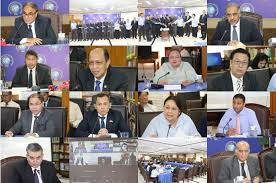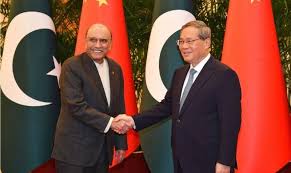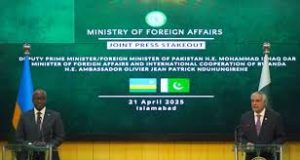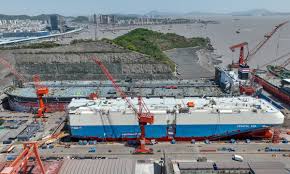ISSI holds roundtable on ‘Pakistan-ASEAN, a Growing Partnership’ on ASEAN Day

Celina Ali
Islamabad: The China-Pakistan Study Centre (CPSC) hosted a roundtable titled “Pakistan and ASEAN: A Growing Partnership,” on the ASEAN Day at the Institute of Strategic Studies Islamabad (ISSI) here Thursday.
The distinguished speakers included heads of Missions of ASEAN member states in Islamabad and Pakistan’s heads of Missions in ASEAN capitals. Ambassador Imran Ahmed Siddiqui, Additional Secretary (Asia Pacific), Ministry of Foreign Affairs, was the chief guest. Ambassador Sohail Mahmood, Director General ISSI, made remarks at the event, whereas Dr. Talat Shabbir, Director CPSC, moderated the session. Prominent civil servants, diplomats, academicians, civil society members, and media personnel attended the event.
Ambassador Sohail Mahmood emphasized the growing partnership between Pakistan and ASEAN, highlighting the collaborative efforts with the Ministry of Foreign Affairs (MoFA) and the ASEAN Committee in Islamabad (ACI). He acknowledged the leadership of ACI, which is presently chaired by H.E. Col. (Retd) Pengiran Haji Kamal Bashah Bin Pengiran Haji Ahmad and the valuable contributions of ASEAN Heads of Missions. Ambassador Mahmood underscored ASEAN’s global salience, noting its economic prowess with a GDP of $3.67 trillion and its strategic relevance in maintaining regional stability and economic integration, including through initiatives like the Regional Comprehensive Economic Partnership (RCEP).

Ambassador Mahmood elaborated on Pakistan’s historical engagement with ASEAN, being the oldest Sectoral Dialogue Partner. He highlighted the expanding scope of collaboration, including trade, counter-terrorism, security, and people-to-people exchanges, with bilateral trade reaching nearly $11 billion in 2022. Emphasizing the need for accelerated progress, he pointed to the importance of implementing Practical Cooperation Areas (PCA) and exploring linkages with the China-Pakistan Economic Corridor (CPEC). He also stressed the importance of moving towards graduating the Sectoral Dialogue to Full Dialogue Partnership. Lastly, Ambassador Mahmood reiterated ISSI’s commitment to reinforcing efforts for strengthening Pakistan-ASEAN relations through ongoing ISSI-ACI dialogue, the ‘ASEAN Corner’, and ISSI-ASEAN think-tank network, fostering deeper ties for mutual prosperity and regional stability.
H.E. Col. (Retd) Pengiran Haji Kamal Bashah Bin Pengiran Haji Ahmad, Chairman ACI and High Commissioner of Brunei Darussalam, highlighted the bloc’s commitment to stability, mutual cooperation, diversity, and inclusivity, which have been instrumental in fostering a resilient region. Ambassador Mohammad Azhar Mazlan, High Commissioner of Malaysia, emphasized the robust bilateral trade that has reached $1.5 billion in 2023-24.
In her remarks, Ambassador Maria Agnes M. Cervantes, the Philippine Ambassador to Pakistan, highlighted severe impact of climate change on both the Philippines and Pakistan, advocating for robust climate action with ASEAN’s support.
Ambassador Wunna Han, Republic of the Union of Myanmar, stressed the strong and multifaceted relationship between Pakistan and ASEAN member states that includes collaboration in areas such as education, religion, cultural exchanges and regional cooperation. Ambassador Pham Anh Tuan of the Socialist Republic of Vietnam underlined long-standing relations between ASEAN and Pakistan including in areas of mutual interest such as politics, culture, science, technology and education. Charge d’ Affaires of the Republic of Indonesia, Rahmat Hindiarta Kusuma, and Ms. Kamolawan Sriposil, Charge d’ Affaires of the Kingdom of Thailand, also spoke about growing Pakistan and ASEAN relations.
Muhammad Faisal shared an academic perspective, emphasizing ASEAN’s success in fostering regional economic support and good relations, serving as a valuable lesson for South Asia. He advocated for stronger dialogue partnerships and bilateral cooperation between Pakistan and ASEAN countries.
Pakistani Heads of Missions posted in ASEAN capitals made interventions at the event. Ambassador Ameer Khurram Rathore, Ambassador to Indonesia and ASEAN, emphasized the critical importance of ASEAN for Pakistan, highlighting the region’s role in maintaining peace, security, and economic integration. Ambassador Zaheeruddin Babar in Cambodia shared growing bilateral trade between Pakistan and Cambodia and highlighted efforts for the opening of a resident Cambodian mission in Islamabad. Pakistan’s High Commissioner to Malaysia Syed Ahsan Raza Shah highlighted the increasing number of Malaysian tourists visiting Pakistan and the robust investment relationship between the two nations. High Commissioner to Singapore Rabia Shafiq underlined that strong bilateral relations between Pakistan and Singapore serve as a crucial gateway to the ASEAN market.
Chief Guest Additional Secretary (Asia Pacific) Ambassador Imran Ahmed Siddiqui highlighted the significant achievements of ASEAN over the past 57 years, emphasizing the successful cooperation among member states towards the shared vision of “One Vision, One Identity, One Community.” Ambassador Siddiqui also underscored the potential for Pakistan to enhance collaboration with ASEAN in trade, economic, political, security, and social and cultural domains, drawing also on shared heritage such as the Gandhara Civilization and Islamic culture. Future avenues for enhanced cooperation were identified including tourism, climate change, counter-terrorism, combating Islamophobia, and cyber security.
The roundtable concluded with remarks by Ambassador Khalid Mahmood, Chairman BoG, ISSI, who highlighted the evolution and significance of ASEAN over its 57-year history, emphasizing its role in promoting connectivity, trade, and investment in Southeast Asia and beyond. Earlier, in his remarks, Dr. Talat Shabbir highlighted the evolving partnership between Pakistan and ASEAN. He emphasized Pakistan’s status as a Sectoral Dialogue Partner of ASEAN since 1993 and highlighted Pakistan’s efforts to become a Full Dialogue Partner as part of the “Vision East Asia” policy.





